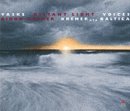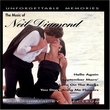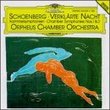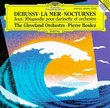| All Artists: Peteris Vasks, Gidon Kremer, Kremerata Baltica Title: Vasks: Distant Light (Concerto for Violin and String Orchestra); Voices (Symphony for Strings) Members Wishing: 1 Total Copies: 0 Label: Teldec Release Date: 11/9/1999 Genre: Classical Styles: Forms & Genres, Concertos, Historical Periods, Modern, 20th, & 21st Century, Symphonies Number of Discs: 1 SwapaCD Credits: 1 UPC: 639842266024 |
Search - Peteris Vasks, Gidon Kremer, Kremerata Baltica :: Vasks: Distant Light (Concerto for Violin and String Orchestra); Voices (Symphony for Strings)
 | Peteris Vasks, Gidon Kremer, Kremerata Baltica Vasks: Distant Light (Concerto for Violin and String Orchestra); Voices (Symphony for Strings) Genre: Classical
The grand scale of Arvo Pärt and Giya Kancheli, some very striking climaxes, and the nostalgic strains of Latvian folk music seem to collide in the compositions of Peteris Vasks. Romantic, melancholic, and utterly e... more » |
Larger Image |
CD DetailsSynopsis
Amazon.com The grand scale of Arvo Pärt and Giya Kancheli, some very striking climaxes, and the nostalgic strains of Latvian folk music seem to collide in the compositions of Peteris Vasks. Romantic, melancholic, and utterly enjoyable, Vasks sounds at times like Pärt for people with short attention spans--as glacial as his music can get, an explosive violin solo or familiar waltz is just around the corner. There's an unmistakable sadness that never escapes his work, obviously reflective of the tumultuous nature of his Latvian homeland. But this emotion-filled music seems tailor-made for violinist Gidon Kremer, who--accompanied here by his hand-picked KremerATA Baltica ensemble of young Baltic-area musicians--clearly embraces the works. Distant Light is a 30-minute single-movement concerto, where graceful string passages give way to soaring violin solos. Voices is a symphony for strings with quiet expanses, birdsong, and a tumultuous third movement. Simply put, these are gorgeous works. Vasks is clearly a composer to watch and Kremer, as usual, is brilliant. --Jason Verlinde Similar CDs
Similarly Requested CDs |
CD ReviewsEssential listening Dennis M. Patterson | voorhees, nj USA | 12/02/1999 (4 out of 5 stars) "Vasks' String Quartets and his Cello Concerto remain his best work to date. This disk contains music a Vasks aficionado would surely love. The only negative is the packaging. The soloist-- Kramer -- (who is, of course, an excellent violinist) is featured in a way gets in the way of appreciating Vasks. The booklet for the CD is an ad for Kramer, not other music of Vasks." Distant Light, Voices Dr. Christopher Coleman | HONG KONG | 10/16/2000 (3 out of 5 stars) "Distant Light, a violin concerto by Latvian composer Peteris Vasks, is uperbly performed by violinist Gidon Kremer and his Kremerata Baltica ensemble. This Teldec CD also features Vasks' symphony for strings entitled Voices. Both works are permeated by a sense of melancoly created by rather soft dynamics, very simple textures, an estremely slow harmonic motion--often elaborating a drone or single harmony for a minute or more at a time, and beautifully expressive extended melodic lines. Vasks' music is very much in the tradition of more well-known Central European composers Henryk Gorecki and Arvo Part, even Alan Hovhaness. Indeed, several moments of both works on this CD are remarkably similar (one might even say uncomfortably similar) to sections of Gorecki's Symphony of Sorrowful Songs. Vasks himself claims a strong influence from Polish avant-garde music, particularly that of Witold Lutoslawski. This influence is scarcely apparent in these pieces, however--they are for the most part extremely conservative, more reminiscent of Samuel Barber's Adagio for Strings, with a touch of New Age sensibility.Vasks is largely self-taught as a composer, although clearly not adverse to closely examining those he admires for models. His formal musical training is primarily as a double bass player, and his knowledge of stringed instruments is clearly seen, as he achieves wonderfully rich sonorities. The writing is beautifully complemented by the outstanding performance of the Kremerata Baltica ensemble, a group of young musicians from the Baltic States of Latvia, Lituania and Estonia. Intonation and expression are impeccable, but perhaps most noteworthy is the gorgeous depth of tone the ensemble achieves. Kremer himself presents a sensational performance, fluently navagating the technical and virtuostic difficulties while creating a remarkable variety of tone color. The cadenza of Distant Light leads to the climax of the concerto and shows not only Kremer's flair for the dramatic, but also one of the few passages in which the influence of Lutoslawski and the Polish avante-garde can be seen.To my ear, the stylistic disparities here are too great to be completely successful in the context of the whole. The climax, described by Vasks as "aleatory chaos" represents only a few seconds of an otherwise almost entirely traditional composition lasting almost half an hour. It therefore seems more something artificially grafted onto the work than something achieved--a sort of Deus ex machina of evil rather than of delivery and redemption, if you will. Vasks' programmatic concern is the struggle of man for freedom from oppression--specifically the struggle of the Baltics for freedom from the Soviet empire. Oppression itself is not the subject of Vasks' attention, but nevertheless, that such oppression be represented by aleatory chaos is, frankly, cliched. This is the kind of gesture that beginning composition students make--and that it is wildly out of proportion to the rest of the work (and furthermore followed by a curious pastiche-updating of Liszt's Mephisto Waltz) makes it unconvincing and lacking in conviction. If only the oppression of the Baltic peoples by the Soviets were so short and readily abandoned. Vasks misses his chance to truly develop a meaningful climax out of the materials he has worked so successfully with up to this point. Having said this, though, it is the only miscue on the recording. Otherwise, performance and compositions are well worth repeated listening." Compelling Mary E. Moore | U. S. | 01/10/2000 (5 out of 5 stars) "Simply a "must hear" if you are a fan of Part and love the beauty of violins."
|

 Track Listings (4) - Disc #1
Track Listings (4) - Disc #1





